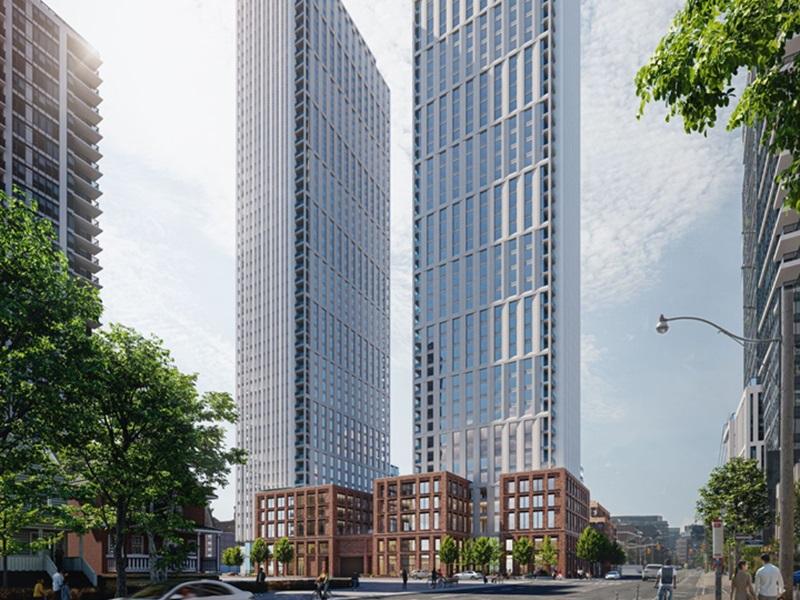
Jackson Turner is a Toronto-based CBRE broker and its urban retail team vice-president. (Courtesy CBRE)
Social media exposure and a desire for higher visibility are prompting some health and wellness service providers to move from offices to urban street-front retail locations, according to Toronto-based CBRE broker and urban retail team vice-president Jackson Turner.
Moreover, developers and landlords see them as attractive tenants.
“Medical and health and wellness operators are a destination,” Turner told RENX. “They don’t need to be front and centre, but they want to have a relatively good presence.
“People will seek them out and institutional landlords are becoming more open to these uses because they drive traffic to their centres, whether it’s in the bottom of an office building or at the base of a condo building.”
These health and wellness locations can also draw people to businesses in the same building or nearby, which large building owners see as another plus.
“Social media followings are luring institutional groups that have traditionally been covenant-driven,” said Turner. “Especially today, with the question marks around office and how long it’s going to take to get people back in, I think offering great amenities at the base of your building and offering great amenities in the surrounding areas, if you own a portfolio of buildings, will be a benefit.”
Companies that have taken the plunge
Turner provided examples of health and wellness companies which have made moves to increase their visibility.
Myodetox, which provides hands-on myofascial treatment and corrective exercise, has attracted a new and different demographic by investing money in attractive locations. It also focuses on customer acquisition through Instagram and social media by creating what’s perceived as a cool brand.
Myodetox offers custom-designed therapy pods, curated music through a high-end audio system, localized beverages, upscale amenities and a guest experience team to its customers at its Vancouver, Toronto and Los Angeles locations.
Twig Fertility opened a large, technology-enabled clinic at the corner of Avenue Road and Eglinton Avenue in Toronto.
Turner said the facility was designed to remove any potential negative stigma that has traditionally been associated with fertility clinics through championing inclusivity and endeavouring to provide a more thoughtful, personal and comfortable clinical experience.
Formula Fig has three Fig Bar locations in Vancouver and will open its first Toronto outlet on Ossington Avenue, as well as a Los Angeles site, next year. It provides injectable wrinkle relaxers, vitamin shots, intravenous treatments, facials using the latest technology and a variety of creams, lotions and other skincare products.
“That’s a very good example of someone who’s gone over and above when it comes to quality of build-out and design and the amount of attention they’ve put towards social media,” said Turner.
Health and wellness improves vibrancy
Turner said it’s too early to have data on whether these moves have helped both health and wellness service providers and their landlords.
However, he offered anecdotal evidence of how changes in Toronto’s Yonge Street and St. Clair Avenue district over the past five to seven years have transformed a relatively sleepy area with sub-par retail into a more vibrant hub.
Turner has worked with Slate Asset Management, which owns a portfolio of properties in the neighbourhood, to find the right street-level retail and commercial amenities and tenants to attract consumers. In turn, this helps attract office tenants above these operations.
He said Slate has been leasing larger floorplates to higher-quality tenants, which he believes has been assisted by the improved retail and commercial offerings.
Turner said there hasn’t been a major reset on street-front retail rents for spaces below 5,000 square feet due to the COVID-19 pandemic, so that hasn’t been a driving force behind these moves by health and wellness service providers.
Developers have, however, become willing to sell vacant retail space on the ground floors of their buildings instead of leasing it, according to Turner. Users may also be able to get good financing rates to buy instead of lease.
“We do a fair amount of leasing in downtown Toronto along with investment sales,” said Turner. “One of the things we’ve seen a lot of interest in while working with some residential developers during COVID is they’re looking to get rid of the retail at the base of their condo buildings.”
“Traditionally it was all about leasing it up, but now you’re seeing some medical groups — who may not be the biggest social media or Instagrammable groups — and quasi-retail/office service and professional groups looking to buy and own their own real estate below some of these developments.”











